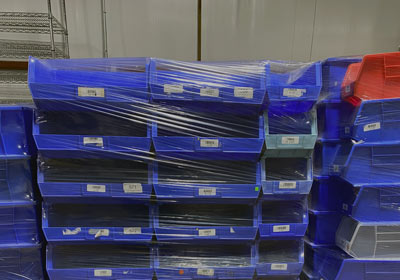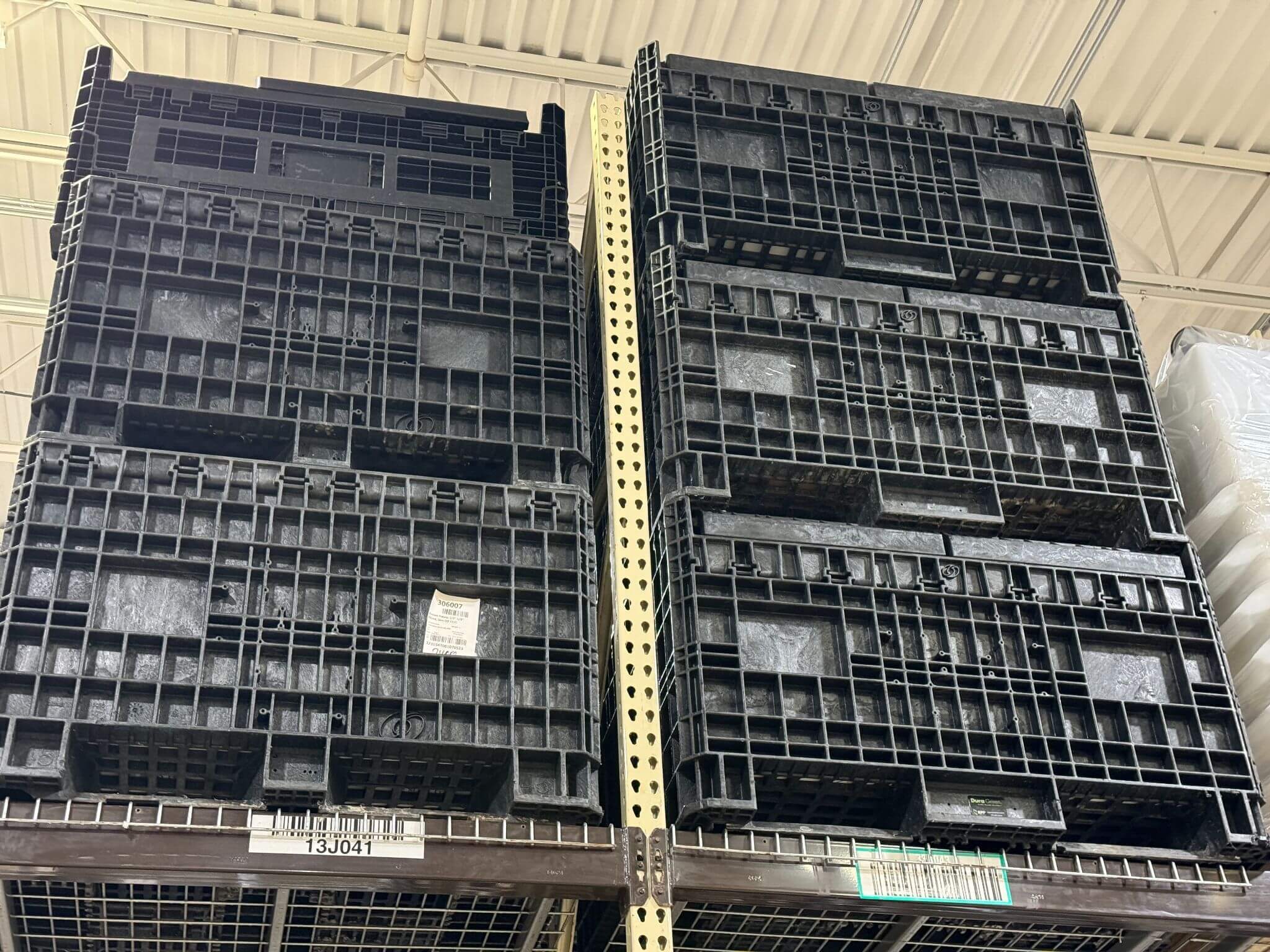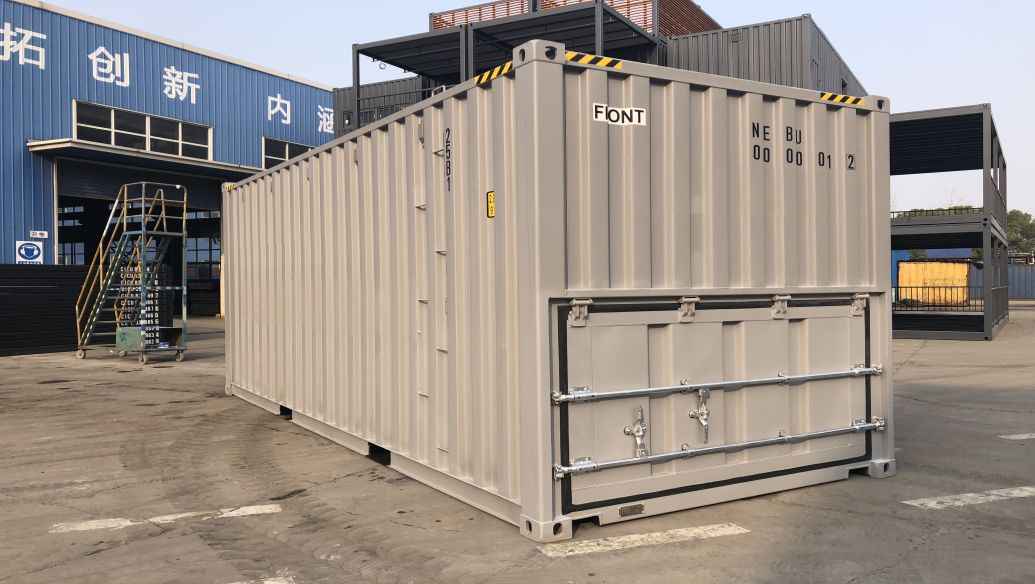Why Bulk Containers Are Crucial for Sustainable and Affordable Transport
Bulk containers play a crucial duty in modern logistics. They promote the reliable motion of big amounts of items, therefore enhancing transport procedures. This technique not just minimizes prices yet also lessens environmental effect with reduced exhausts and waste generation. As markets look for even more lasting techniques, the fostering of mass containers is coming to be progressively considerable. What ramifications does this shift hold for future logistics and supply chain administration?

The Advantages of Making Use Of Bulk Containers in Logistics
Bulk containers reinvent logistics by boosting efficiency and sustainability. These containers permit the transport of big quantities of products in a solitary trip, noticeably decreasing the number of trips required. This not only streamlines procedures however additionally decreases labor costs associated with handling, filling, and dumping. On top of that, bulk containers are developed to maximize area use within transportation vehicles, guaranteeing that more items can be delivered all at once.
The standardization of bulk containers also streamlines the logistics procedure. With consistent measurements, they can be conveniently piled and saved, leading to improved warehouse management. Moreover, mass containers frequently feature durable products that shield contents from damage throughout transportation, thereby lowering product loss and increasing overall dependability. Therefore, services can experience enhanced supply chain performance, inevitably resulting in enhanced success and customer complete satisfaction. This combination of variables makes mass containers a critical asset in modern-day logistics.
Ecological Effect: Minimizing Waste and Carbon Footprint
As sectors increasingly focus on sustainability, the adoption of bulk containers has actually emerged as a key method for reducing waste and decreasing carbon footprints. These containers minimize using product packaging products, such as boxes and plastic, therefore significantly reducing overall waste generation. By consolidating shipments, bulk containers enhance transport performance, permitting even more items to be transferred per journey. This decrease in journeys straight correlates with lower greenhouse gas emissions, adding to a smaller carbon impact.
Additionally, bulk containers can commonly be reused or recycled, better mitigating environmental impact. The resilience of these containers assurances they can withstand several transport cycles, reducing the requirement for single-use choices. used collapsible bulk containers. By improving logistics and promoting effective source usage, mass containers not just support sustainable methods however additionally urge sectors to straighten with global ecological goals. Ultimately, their execution mirrors a commitment to eco-friendly stewardship and liable source management
Cost Cost Savings: Exactly How Bulk Containers Lower Transportation Expenses
While many companies look for means to boost their profits, making use of bulk containers offers a significant opportunity for lowering transport costs. Bulk containers optimize the volume of goods transported, permitting companies to ship bigger amounts simultaneously. This effectiveness decreases the number of journeys needed, directly reducing fuel expenses and minimizing labor costs connected with loading and discharging.
Furthermore, mass containers typically include streamlined designs that enhance area application within transportation automobiles. This indicates fewer empty areas, leading to much more effective usage of offered ability. Additionally, the longevity of bulk containers can lower the danger of product damages throughout transit, lowering losses and guaranteeing that even more goods show up undamaged.
Enhancing Supply Chain Efficiency With Mass Storage Space Solutions
Bulk storage solutions play an essential function in boosting supply chain efficiency by enhancing supply management. By combining items into less, bigger containers, services can greatly decrease managing expenses related to regular transfers and handling. This structured technique allows for better monitoring and management of inventory, eventually causing boosted functional efficiency.
Structured Inventory Management
Effective stock administration is crucial for maximizing supply chain procedures, especially when companies take on bulk storage space remedies. These solutions enable organizations to maintain higher supply degrees while minimizing the frequency of replenishment. By consolidating materials into bulk containers, business can improve their inventory processes, reducing the intricacy linked with tracking several smaller packages. This strategy assists in accurate supply matters and boosts forecasting precision, permitting even more enlightened decision-making. Furthermore, bulk storage space services streamline storehouse company, making it simpler to find and gain access to products when required. Because of this, companies can accomplish a more efficient supply turnover price, eventually improving overall supply chain efficiency and minimizing the possibility of stockouts or overstock situations.

Reduced Handling Costs
The implementation of bulk storage space solutions not just simplifies stock monitoring however likewise substantially reduces managing expenses throughout the supply chain. By consolidating products right into mass containers, companies lessen the demand for frequent handling and transfer between various storage space and transportation systems. This strategy reduces labor prices connected with loading, dumping, and moving smaller sized bundles. In addition, mass storage space reduces the frequency of deliveries, bring about lower transport costs and decreased fuel usage. Therefore, organizations can maximize their logistics procedures, enabling for an extra reliable appropriation of resources. Ultimately, decreased managing prices add to enhanced general supply chain effectiveness, promoting an environment that sustains both sustainability and financial feasibility.

Versatility of Mass Containers Throughout Different Industries
Numerous markets have distinctive requirements for transport and storage, mass containers have actually arised as a functional solution that satisfies a large array of needs. These containers, varying from large bins to specialized storage tanks, can fit varied products, consisting of fluids, granules, and powders. In the farming field, mass containers help with the transport of grains and plant foods, while the food and drink industry utilizes them for ingredients and completed products. The chemical industry counts on bulk containers for securely moving unsafe products, ensuring conformity with safety policies. Furthermore, building and construction firms gain from mass containers for transporting accumulations and various other products. Their versatility includes different modes of transportation, consisting of vehicles, trains, and ships, boosting logistical effectiveness. This flexibility not only enhances procedures throughout different industries but additionally advertises sustainability by decreasing product packaging waste and enhancing space en route. Consequently, mass containers play a crucial duty in contemporary supply chain management.
Future Fads in Mass Container Usage and Sustainability
The future of mass container usage is increasingly formed by ingenious products development that boosts sustainability. Additionally, automation in logistics promises to simplify operations, lowering waste and enhancing performance. Embracing round economic situation techniques will additionally transform just how bulk containers are developed, made use of, and recycled, promoting a much more lasting transportation landscape.
Ingenious Products Development
As markets increasingly prioritize sustainability, cutting-edge materials advancement in bulk containers becomes a considerable consider boosting environment-friendly transportation remedies. Scientists and suppliers are exploring eco-friendly plastics, recycled composites, and lightweight steels to decrease ecological influence. These products not just reduce waste however additionally enhance gas effectiveness by lowering the overall weight of containers. Additionally, improvements in wise products, which can adapt to varying conditions, enhance the durability and functionality of mass containers. The assimilation of these ingenious materials aligns with circular economic situation concepts, advertising reuse and recycling. As the demand for lasting practices expands, the development of such products will certainly play a vital role in shaping the future of mass container use in logistics and transportation.
Automation in Logistics
Significant innovations in automation are poised to change logistics and the usage of bulk containers, improving sustainability in transport. Automated systems, consisting of drones and self-governing automobiles, are enhancing the motion of bulk containers, decreasing the reliance on conventional fuel-powered transport. These technologies optimize transmitting and filling procedures, lessening empty miles and improving fuel efficiency. Additionally, automated supply administration important link systems improve tracking and monitoring of mass containers, making certain much better source allowance and decreased waste. The integration of the Internet of Points (IoT) permits real-time data analysis, making it possible for aggressive decision-making that aligns with sustainability objectives. As automation remains to develop, it is anticipated to drive additionally technologies wholesale container use, inevitably supporting even more lasting logistics methods and minimizing the environmental effect of transportation.
Round Economic Climate Practices
Developments in automation are establishing the stage for a much more integrated technique to circular economic climate practices in the domain name of bulk container usage. As sectors progressively embrace sustainability, mass containers are being created for longevity and reusability. This shift not just minimizes waste yet also enhances resource efficiency. Business are adopting approaches such as closed-loop systems, where used containers are collected, refurbished, and reintroduced into the supply chain. Furthermore, smart modern technologies track container life cycles, promoting far better administration and lowering ecological influence. The collaboration between manufacturers, logistics carriers, and end-users is vital in establishing requirements for lasting container usage. used collapsible bulk containers. Future patterns show an expanding focus on products that are recyclable and biodegradable, more reinforcing the circular economic climate's principles wholesale transport

Regularly Asked Inquiries
What Materials Are Mass Containers Normally Made From?
Bulk containers are generally constructed from sturdy materials such as high-density polyethylene, steel, light weight aluminum, and cardboard. These materials offer strength, defense, and versatility, making them ideal for transferring different products in various sectors successfully.
Just how Do I Choose the Right Size Bulk Container?
Selecting the ideal dimension mass container involves evaluating the volume of products to be transferred, taking into consideration dealing with devices compatibility, and evaluating storage room needs. Correct dimension guarantees performance in transport and minimizes waste during shipment.
Are Bulk Containers Reusable or Recyclable?
Mass containers are frequently recyclable, created for numerous journeys, boosting sustainability. Many can also be recycled, depending upon the products utilized. Picking recyclable alternatives further reduces and supports environmental objectives waste in transportation practices.
What Safety Regulations Relate To Mass Container Transportation?
Safety policies for mass container transport include compliance with the Division of Transport standards, appropriate labeling of dangerous materials, architectural stability evaluations, and adherence to weight restrictions to assure safe handling and protect against mishaps throughout transit.
How Can Companies Shift to Utilizing Mass Containers Efficiently?
Businesses can transform to bulk containers by evaluating existing logistics, educating personnel on handling, buying appropriate tools, maximizing supply monitoring, and working together with suppliers to assure compatibility and performance throughout the supply chain.
As sectors progressively prioritize sustainability, the adoption of mass containers has actually emerged as a crucial strategy for click here for more minimizing waste and lowering carbon footprints. By settling materials into mass containers, companies can improve their stock procedures, decreasing the intricacy linked with tracking multiple smaller bundles. As sectors progressively focus on sustainability, innovative materials over here growth in mass containers emerges as a significant variable in enhancing green transportation services. Automated systems, consisting of drones and independent vehicles, are improving the motion of bulk containers, decreasing the dependence on conventional fuel-powered transport. Furthermore, automated supply management systems improve monitoring and monitoring of mass containers, making sure better resource allotment and lowered waste.